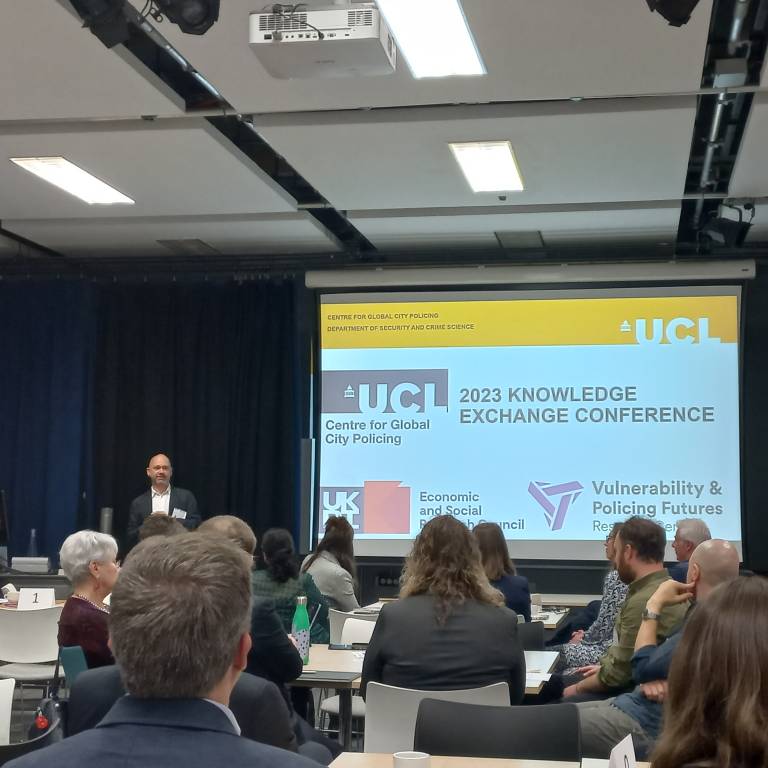Conference highlights complex challenges faced by modern policing
1 July 2023
The UCL Centre for Global City Policing held their annual Knowledge Exchange Conference, identifying current problems around tackling sexual offences

This deliberative conference brought together academics, senior police leaders and the voluntary sector to focus on the pressing problems facing police forces in global cities and across the UK.
The Centre for Global City Policing sits within the UCL Jill Dando Institute of Security and Crime Science, working alongside the Metropolitan Police and MOPAC (the Mayor’s Office for Policing and Crime), seeking to enhance ‘praxis’: the exchange of knowledge and understanding between academics and practitioners, and the infusion of academic research into practice and vice versa.
We were privileged that Professor Betsy Stanko, OBE, and Professor Katrin Hohl, could take time out of their invaluable work on Operation Soteria Bluestone to discuss their findings and progress on how the police tackle sexual offences. It was also a pleasure to welcome Dr Daniel Birks from Leeds and Professor Martin Webber from York who offered a fascinating insight into how data analytics can help manage demand for police services.
In the final session, we were fortunate to hear from Dr Paolo Campana from Cambridge University and DCI Lewis Prescott-Mayling from Thames Valley Police who provided a thoughtful and comprehensive exploration of relational models of crime – using a public health model to track ‘contagion’ between offences to improve crime prevention.
The conference was concluded by three young people working with the Violence Reduction Unit: Leonita Metaj, Bipin Khanal and Jonas Phillips, who stole the show with a valuable contribution around the ways police can work with, and for, their communities. We were particularly grateful to Professor Adam Crawford from Leeds and York Universities for introducing our speakers, and to the ESRC Vulnerability & Policing Futures Research Centre, who funded the event.
Coming so soon after the release of the Casey Report, it was particularly timely to hear from Professors Stanko and Hohl, whose presentations triggered extensive discussion around the roles of organisational culture, workforce planning, investment and understanding gendered dynamics, in improving police response to rape and others sexual offences. They emphasised the crucial importance of focussing on the perpetrator, identifying repeat offenders, and recording key data.
Professor Ben Bradford, Director of the Centre for Global City Policing, summed up:
“In an ever more connected and complex world it is imperative that police organisations learn not only from one another but also from academic and other researchers working on issues of crime, (dis)order and policing. And as the social and technical problems faced by police organisations change and develop, and as the geographical boundaries of those problems become more and more fluid, there is a pressing need for new evidence, insight and practice to be developed at international as well as national scales. Yet, while there are many formal and informal structures linking police organisations in different countries, relatively few of these embed police-academic partnerships, and none do so in ways founded on bottom-up approaches that allow practitioners and researchers to work together to develop programmes of work tailored to meet new and emergent problems.In an ever more connected and complex world it is imperative that police organisations learn not only from one another but also from academic and other researchers working on issues of crime, (dis)order and policing. And as the social and technical problems faced by police organisations change and develop, and as the geographical boundaries of those problems become more and more fluid, there is a pressing need for new evidence, insight and practice to be developed at international as well as national scales. Yet, while there are many formal and informal structures linking police organisations in different countries, relatively few of these embed police-academic partnerships, and none do so in ways founded on bottom-up approaches that allow practitioners and researchers to work together to develop programmes of work tailored to meet new and emergent problems.In an ever more connected and complex world it is imperative that police organisations learn not only from one another but also from academic and other researchers working on issues of crime, (dis)order and policing. And as the social and technical problems faced by police organisations change and develop, and as the geographical boundaries of those problems become more and more fluid, there is a pressing need for new evidence, insight and practice to be developed at international as well as national scales.
Yet, while there are many formal and informal structures linking police organisations in different countries, relatively few of these embed police-academic partnerships, and none do so in ways founded on bottom-up approaches that allow practitioners and researchers to work together to develop programmes of work tailored to meet new and emergent problems.
 Close
Close

